DHA: practical, applicable skills for busy administrators
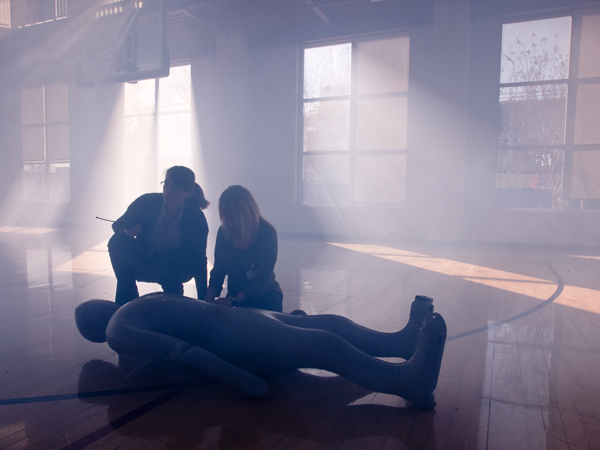
Published in News Stories on January 21, 2016
Swapping scrubs for a business suit is a common transition for many holding administrative positions in health care today. The role of health-related administrator often follows a successful career as a health-care provider.
Those more comfortable in an exam room than a board room may search for additional education to make the transition easier, but there's not much time for sitting in a classroom talking theory. What is needed is a practical, focused education that can be immediately applied in the trenches.
For Sherry West, assistant professor of radiologic sciences and program director for Nuclear Medicine Technology at the School of Health Related Professions, the Doctor of Health Administration program at SHRP gave her practical knowledge that she has already applied at the Medical Center. West is a member of the first DHA cohort, which completed the program in May of 2015 and will walk at commencement in May of 2016.
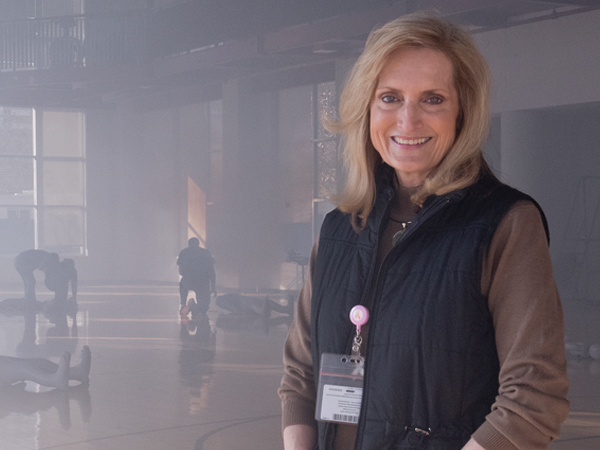
Sherry West serves as the SHRP representative for the Interprofessional Education Collaborative.
“I knew I wanted a terminal degree,” said West. “I wanted a degree that would be meaningful, that would be something I could use, that wasn't bench research. I wanted an applied doctoral degree.”
West began her career later in life, after her children were grown. She began working as a nuclear medicine technologist in 2004 after receiving her certificate in nuclear medicine technology from UMMC. While working in nuclear medicine, West completed her undergraduate and graduate degrees. In 2009, she became the director of UMMC's nuclear medicine program at SHRP.
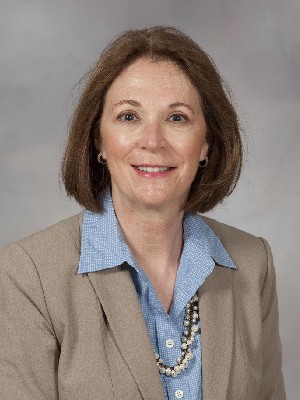
Dr. Jessica Bailey, dean of SHRP and program director for health administration, said the program is ideal for those whose career progression has led them to administrative positions.
“We provide them with a skill-set that is missing when they move up through the ranks,” said Bailey. Classes such as finance, health policy and economics are not often part of the curriculum for future health-care providers.
The three-year program culminates in a final project. Students decide on the topic in research classes early on. Dr. Ellen Jones, assistant professor of health administration, said students are encouraged to pick a topic that is of personal interest to them.
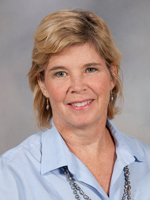
Jones
“When they come up with their projects, they start looking at 'what are the pressing problems in this state or the nation that I'm really passionate about?'" said Jones. “They propose a problem statement. We help them develop an inquiry, and they come up with a product or a solution or a tool that can be used to address what they've found. We assign advisers to the student's review committee who can help them apply the project right away in Mississippi or in another state.”
For West that area of personal interest was interprofessional education or IPE.
“What I noticed here on this campus, particularly within SHRP, is that we have all these programs, and we do such a phenomenal job at training our students that isolation develops between the programs,” said West. “While that might have been okay several years ago, health care has changed.
“The lines between providers in the health-care setting have become blurred, and we all work as a team now. Sometimes our graduates were leaving us with great skills in their professions but without a real knowledge or appreciation for the roles of other health-care members because they had not had the experience of working with them.”
West's research included looking at IPE programs from other institutions across the country, discovering what worked and what didn't. She applied these best practices to the environment at UMMC and developed the Building Bridges Program which is now being piloted at SHRP.
West began an IPE committee within SHRP to implement the program, which will begin with first-year students attending Building Bridges Day, a professional education day to be held on March 3. The day will begin with speakers from across the UMMC campus.
“Speakers from within our institution come in and tell what their department does, what they teach their students, why they teach it, and what their role is in the health care team,” West said. “Then we are going to bring in a patient who has had care provided as part of an interprofessional team, like a transplant patient or someone who has had significant amount of care provided by a variety of health practitioners and let them talk about how that team took care of them.”
The afternoon will include teamwork and communication exercises based on core competencies for interprofessional education. West said that beginning this program is important because many accrediting bodies are now requiring programs to include an IPE aspect.
Not only has West been able to apply the research and knowledge from the DHA program to address IPE at SHRP, but she has also taken a role in the development of IPE across campus.
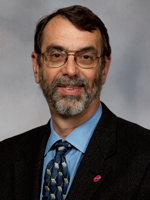
Rockhold
Shortly after receiving her doctorate, West was able to fill an open position as a SHRP representative on the campus-wide Interprofessional Education Collaborative, headed by Dr. Robin Rockhold, professor of health sciences and deputy chief academic officer.
“Sherry brings enthusiasm and energy to the collaborative,” said Rockhold. “She's taken charge of managing the canvas course that, largely, she built and is the means by which we are bringing students together.”
Eight students and four faculty from each of the six schools on the UMMC campus met monthly to learn core competencies involved in interprofessional collaboration. The core competencies are values and ethics for interprofessional practice, roles and responsibilities, interprofessional communication, and teams and teamwork.
West said that the exercise for roles and responsibilities was to create a time capsule.
“The students came together for lunch that day and brought items that represented their profession to put in a time capsule and explained why they chose the item,” said West. “They knew going in that the class was a commitment to show up once a month, have lunch and interact interprofessionally, building towards the event in January.”
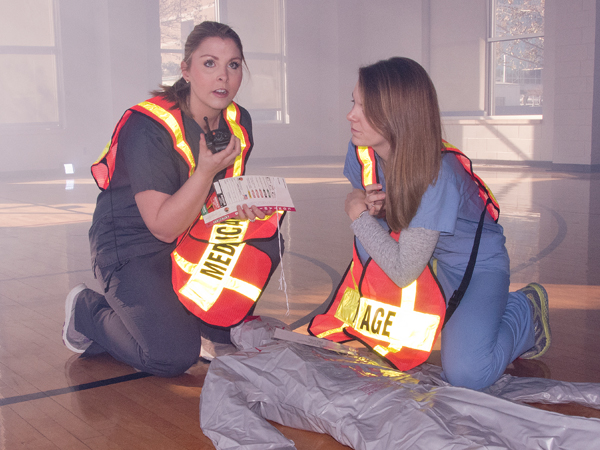
Jessie Morgan Vaughn, (left) SOD and Mary Jarrell, SOP, call for more resources during an exercise in the Norman C. Nelson Student Union.
That event was held Tuesday at the Norman C. Nelson Student Union. The groups of students representing the School of Medicine, School of Nursing, School of Dentistry, School of Pharmacy, School of Graduate Studies in Health Sciences and School of Health Related Professions took part in an interprofessional disaster planning exercise to test what they had learned since August.
There were four stations representing four disasters that the students rotated through. In the gymnasium, the scene a public bombing, the teams were tasked with triaging those near the blast and calling in for support using handheld radios.
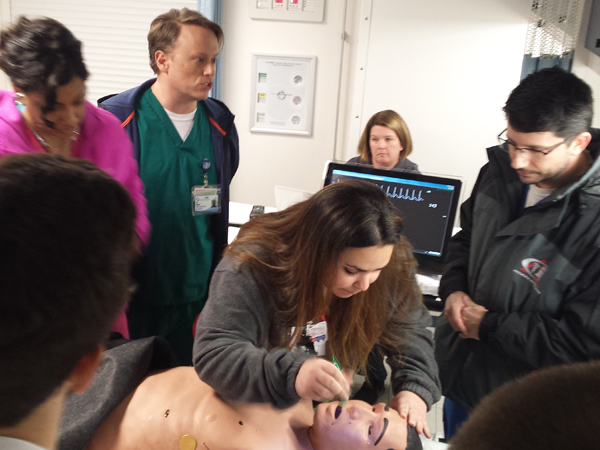
An interprofessional group takes part in an exercise simulating a youth exposed to organophosphate poison. From the right are Dr. Benji Dillard, professor in pediatric emergency medicine, Kristen Purser, SON, Eric Holland, PT resident, and Davelin Woodard, SON.
In the Mobile Emergency Treatment and Training System, an 18-wheeler equipped to provide care at the scene of a disaster, a 15-year-old male from a farm in the Mississippi Delta has been found lying unresponsive in the yard by his dad. The team runs through the exercise of arriving on the scene and providing field diagnosis and care in a rural area with limited resources.
Other scenarios included a nuclear attack and resource allocation in a health crisis. The groups will hold their final lunch-time meeting in February to discuss in small group sessions how the event went.
In a way, the DHA program mirrors the IPE that was the focus of West's research.
“When I began the DHA program, I found that it is interprofessional education in and of itself,” said West. “You have people from all different spectrums across the health-care environment. We are learning from and with each other as we go through these three years.
“We get to see health care at the real level from all these different professions in very non-threatening way and pool our knowledge. So that part of it is what makes a DHA unique and different. It's very meaningful and very useful. I am very proud to have done it.”


